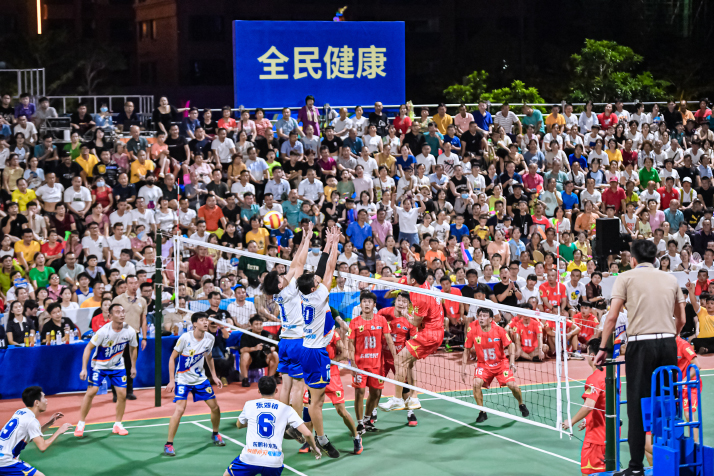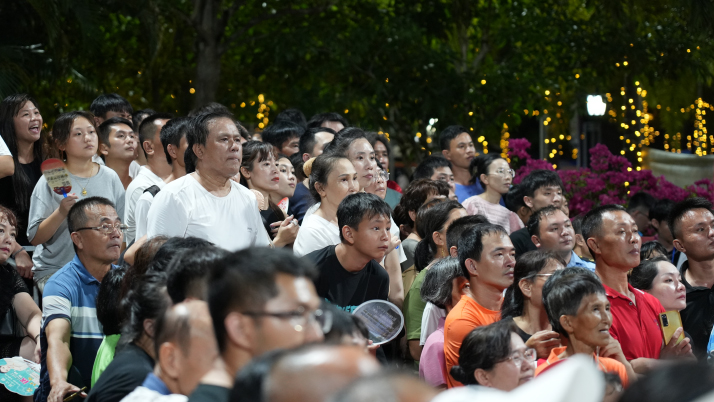| China |
| How volleyball enhances the wellbeing of a southern Chinese city's residents | |
|
|
|
Nearly two hours of intense competition culminated in a sharp "FWEET!" from the referee's whistle. On August 13, the Dongjiao Town and Dongge Town teams battled it out over five sets in the final of the 2023 Hainan Wenchang Village Volleyball Association (Village VA) league in tropical Hainan Province in south China. Ultimately, Dongjiao won in a heart-stopping grand final, defeating Dongge 21-18.
The commentator exclaimed, "Both teams played at a high level in every set and kept the crowd enthralled. This match was full of passion and gave everyone a taste of the magic of volleyball!"  A scene from the grand final of the Village VA, a volleyball league, in Wenchang, Hainan, on August 13 (Photo by Sha Xiaofeng)
After kicking off on June 30, the Village VA unfolded over six weeks, with 20 teams competing in 52 exciting matches. According to official statistics from Wenchang City, the event attracted more than 480,000 spectators. This kind of sports event also contributes to the development of rural areas and mass sports in China. Fun in the sun Wenchang is reputed as one of the four major powerhouses of volleyball in China. In the 1910s, volleyball was introduced to Wenchang by returned overseas Chinese and missionaries, marking the birth of the sport in the region. In 1958, Wenchang Middle School won the top spot in the Junior National Volleyball Championship for the first time. The school continued its success and has since won about 35 national volleyball championships. It is also the place where a number of excellent volleyball players playing for provincial and national teams first received their volleyball training. After Hainan became a province in 1988, the region's rapid socio-economic growth attracted overseas Chinese entrepreneurs and individual business owners. Volleyball matches were adopted both as a celebration of thriving businesses and as a form of entertainment. This approach led to a steady stream of volleyball competitions in Hainan's cities, counties and towns as well as promoted the growth of the island's volleyball culture. To this day, Hainan residents prefer to celebrate major festivals and celebrations with volleyball games rather than the more traditional song and dance performances. People of all ages set up volleyball nets and play the sport barefoot or in flip-flops. As Hainan transformed from an economic backwater into a thriving economic hub, becoming China's largest special economic zone in 1988 and now underway to establishing itself as the country's only free trade port, the revitalization of the island's rural areas is moving full steam ahead. Infrastructure upgrades, including rural power and road networks, as well as the construction of public, cultural and sports facilities, have been rolled out one after the other. As a result of these efforts, farmers' incomes have been on the rise and these hardworking people are showing more interest in leisure activities, including volleyball. While institutions such as Wenchang Middle School, Qiongshan Middle School and Hainan Normal University have made remarkable achievements in volleyball competitions at the national level, amateur players, too, are passionate about playing the game. Huang Xiangdao, coach of the Dongjiao team, told Beijing Review that the Dongjiao team includes volleyball coaches in schools as well as people involved in animal husbandry and construction. "Volleyball beats in the heart of Hainan," Huang said. "People start learning volleyball at a young age. More than 80 percent of Hainan's population can play—at different levels." For example, Fu Xiangming, voted the best player in the recently concluded Village VA, is a real grassroots star who hasn't received any professional training. His greatest hobby is playing volleyball. During the day, he works at a local coconut processing factory in Wenchang. In the evening, he goes straight to the volleyball court. At dusk, he can almost always be found at the court. "If I'm not playing myself, I'm watching my fellow villagers play," Fu said with a smile. Today, he is a well-known volleyball figure across Hainan and boasts a legion of fans.  With a sense of suspense, onlookers watch the final match of the Village VA, a rural volleyball league, in Wenchang City, Hainan Province in south China, on August 13 (Photo by Wang Ruohan)
Strong support from local governments has contributed to a flourishing volleyball culture in Hainan. Huang Kaiguo, a player from Dongge, noted that every town under the administration of Wenchang has a volleyball team and a group chat on Weixin, one of China's most popular super apps, to announce upcoming matches and communicate with volleyball enthusiasts. Township governments also organize volleyball games to further connect and communicate with villagers, as well as to foster a closer relationship with the community. The local government's support for the development of sports echoes the call of China's National Fitness Plan (2021-25) released by the State Council on August 9, 2021, which emphasizes undertakings such as hosting mass fitness events. A sound mind in a sound body The Village VA not only treats fans to a volleyball spectacle but also serves as an economic catalyst for rural revitalization. The rural revitalization strategy, in its current form, was launched by the Chinese Government in 2017. It was designed to tackle key problems—boosting agricultural production, developing rural housing and land use, improving the environment and reducing poverty in poor areas. Data reveal that from June 30 to August 13, the competition in Wenchang attracted almost half a million spectators, boosting service sectors and generating a tourism income of 280 million yuan ($39.05 million). Moreover, the contribution of the sport to rural revitalization goes beyond the promotion of economic growth—it enhances people's overall physical and mental wellbeing. The Village VA enriches the leisure time of rural residents and keeps them physically active. Moreover, through matches, residents from neighboring villages have strengthened their ties. Nowadays, volleyball not only attracts spectators to Hainan. Some locals, too, are returning to their hometowns to promote the development of the sport. Wang Shuai was born in Hainan and studied at China Petroleum University in Shandong Province, east China, where he played for the school team, which has won consecutive titles in the China University Student Volleyball Championships. Following graduation, he returned to his home province and now works as a volleyball coach at the Hainan Vocational College of Political Science and Law. He played in the final of the Village VA, as part of the Dongjiao team, and his exceptional blocking skills secured the championship. He told Beijing Review, "Wenchang Middle School nurtured me and I feel compelled to give back, promote the development of volleyball and inspire more children to love the sport." Just one week after the Village VA final, Wang led the college volleyball team he coaches to play in the 16th China University Beach Volleyball Championship, taking Hainan's young volleyball enthusiasts on an exciting new journey. Copyedited by Elsbeth van Paridon Comments to wangruohan@cicgamericas.com |
|
||||||||||||||||||||||||||||
|